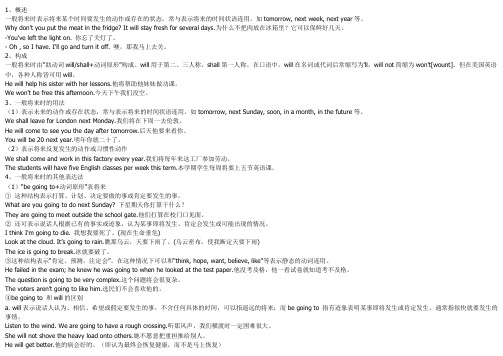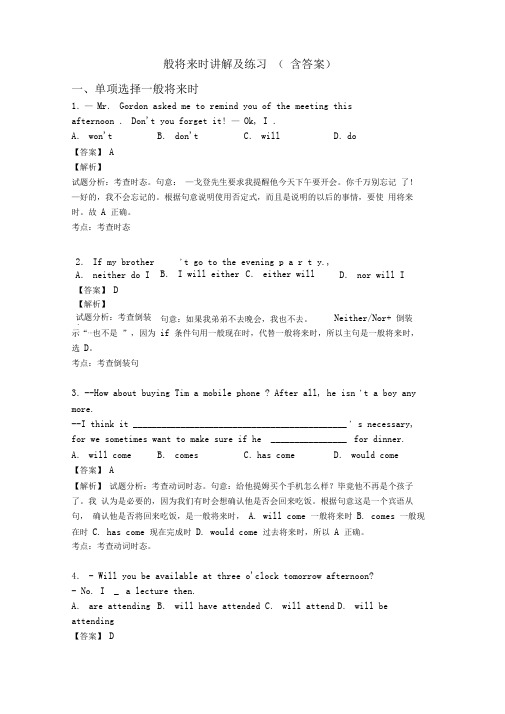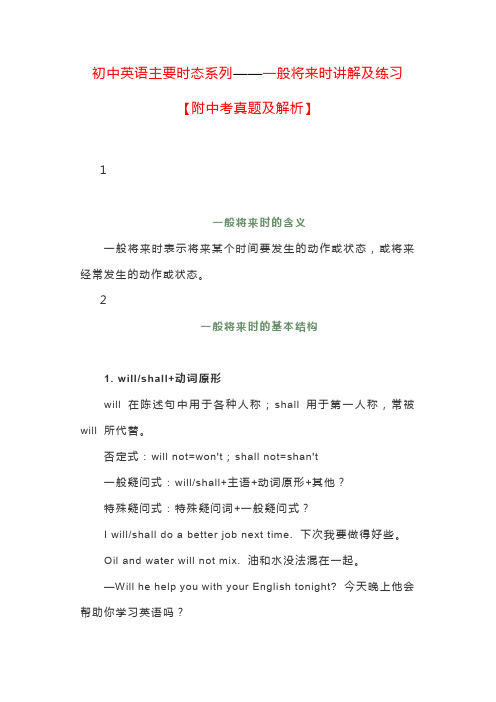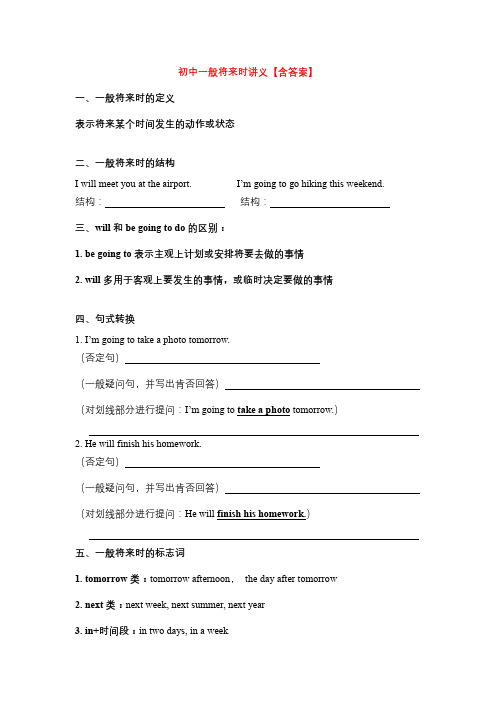初中一般将来时讲解练习及答案(1)
(完整版)一般将来时态讲解及练习和答案

1、概述一般将来时表示将来某个时间要发生的动作或存在的状态,常与表示将来的时间状语连用,如tomorrow, next week, next year等。
Why don’t you put the meat in the fridge? It will stay fresh for several days.为什么不把肉放在冰箱里?它可以保鲜好几天。
-You've left the light on. 你忘了关灯了。
- Oh , so I have. I'll go and turn it off. 噢,那我马上去关。
2、构成一般将来时由“助动词will/shall+动词原形”构成。
will用于第二、三人称,shall第一人称。
在口语中,will在名词或代词后常缩写为'll,will not简缩为won’t[wount]。
但在美国英语中,各种人称皆可用will。
He will help his sister with her lessons.他将帮助他妹妹做功课。
We won't be free this afternoon.今天下午我们没空。
3、一般将来时的用法(1)表示未来的动作或存在状态,常与表示将来的时间状语连用,如tomorrow, next Sunday, soon, in a month, in the future等。
We shall leave for London next Monday.我们将在下周一去伦敦。
He will come to see you the day after tomorrow.后天他要来看你。
You will be 20 next year.明年你就二十了。
(2)表示将来反复发生的动作或习惯性动作We shall come and work in this factory every year.我们将每年来这工厂参加劳动。
【最新】初中英语一般将来时讲解与练习(含答案)

初中英语:一般将来时专项练习题1.If we do something the law, we will .A.against; punished B.with; be punishedC.with; punished D.against; be punished【答案】D【解析】【详解】句意:如果我们做了违法的事,我们将被惩罚。
against反对;with 和…...一起;结合句意,我们做了违反法律的事,应被惩罚,主语we与谓语publish之间是被动关系,故用被动语态,位于助动词will 后,故用动词原形,故选D。
2.It is reported that a space station ______ on the moon in a few years. A.was built B.will be builtC.is built D.has been built【答案】B【解析】【详解】试题分析:句意:据报道,几年后月球上将要建空间站。
表示几年后将要发生的动作,用一般将来时态,主语space station是谓语动词build的承受者,用被动语态。
故选B。
考点:考查动词的时态、语态辨析。
3.The Olympic Games ______ in Tokyo in 2021.A.hold B.will hold C.are held D.will be held 【答案】D【解析】【详解】句意:奥运会将于2021年在东京举行。
考查被动语态。
hold一般现在时;will hold一般将来时;are held一般现在时的被动语态;will be held 一般将来时的被动语态。
根据“in 2022(将来的时间)”可知此句时态是一般将来时,可排除AC选项。
主语“The 24 Winter Olympics”是动词held的受动者,需使用被动语态,可知使用被动语态,故选D。
4.A new mobile cabin hospital(方舱医院) ________ next time you come here.A.is completed B.was completed C.completedD.will be completed【答案】D【解析】【详解】句意:下次你来这的时候,一个新的可移动方舱医院将会完工。
一般将来时讲解及练习(含答案)

般将来时讲解及练习(含答案)一、单项选择一般将来时1.—Mr.Gordon asked me to remind you of the meeting thisafternoon .Don't you forget it! —Ok, I .A.won't B.don't C.will D.do【答案】A【解析】试题分析:考查时态。
句意:—戈登先生要求我提醒他今天下午要开会。
你千万别忘记了!—好的,我不会忘记的。
根据句意说明使用否定式,而且是说明的以后的事情,要使用将来时。
故A 正确。
考点:考查时态2.If my brother doesn 't go to the evening p a r t y.,A.neither do I B.I will either C.either willI D.nor will I【答案】D 【解析】试题分析:考查倒装句:句意:如果我弟弟不去晚会,我也不去。
Neither/Nor+ 倒装句,表示“⋯也不是”,因为if 条件句用一般现在时,代替一般将来时,所以主句是一般将来时,选D。
考点:考查倒装句3.--How about buying Tim a mobile phone ? After all, he isn 't a boy any more.--I think it _____________________________________________ ' s necessary, for we sometimes want to make sure if he ________________ for dinner. A.will come B.comes C.has come D.would come【答案】A【解析】试题分析:考查动词时态。
句意:给他提姆买个手机怎么样?毕竟他不再是个孩子了。
我认为是必要的,因为我们有时会想确认他是否会回来吃饭。
初中英语主要时态系列——一般将来时讲解及练习【附中考真题及解析】

初中英语主要时态系列——一般将来时讲解及练习【附中考真题及解析】1一般将来时的含义一般将来时表示将来某个时间要发生的动作或状态,或将来经常发生的动作或状态。
2一般将来时的基本结构1. will/shall+动词原形will 在陈述句中用于各种人称;shall用于第一人称,常被will 所代替。
否定式:will not=won't;shall not=shan't一般疑问式:will/shall+主语+动词原形+其他?特殊疑问式:特殊疑问词+一般疑问式?I will/shall do a better job next time. 下次我要做得好些。
Oil and water will not mix. 油和水没法混在一起。
—Will he help you with your English tonight? 今天晚上他会帮助你学习英语吗?—Yes, he will./No, he won't. 是的,他会。
/不,他不会。
—When will you arrive for America? 你什么时候去美国?—Tomorrow. 明天。
2. am/is/are going to +动词原形否定式:am/is/are not going to +动词原形一般疑问式:am/is/are +主语+ going to + 动词原形+其他?特殊疑问式:特殊疑问词+一般疑问式?He is going to spend his holidays in London. 他打算在伦敦度假。
Look at the dark clouds. There is going to be a storm. 看那乌云,快要下雨了。
Is he going to collect any data for us? 他会帮我们收集数据吗?What are you going to do tomorrow? 明天你打算作什么?3一般将来时的用法will+动词原形与am/is/are going to +动词原形的用法虽然都表示将来发生动作或情况,一般情况下能互换。
(英语)初中英语重点一般将来时讲解与练习(含答案)

初中英语:一般将来时专项练习题1.What good news! Xiaogan West Station in Yunmeng in two years. A.buildsB.will buildC.is builtD.will be built【答案】D【解析】【详解】句意:多好的消息啊!孝感西站将于两年内在云梦建成。
A. builds 动词三单,建造;B. will build一般将来时态,将要建造;C. is built 一般现在时态的被动语态,被建造;D. will be built一般将来时态的被动语态,将被建造。
根据in two years表示将来的时间短语,以及主谓之间的被动关系,所以本句使用“一般将来时态的被动语态”。
故选D。
2. A Disneyland Park ________ in Shanghai Pudong New Area in the near future.A.has been built B.will built C.will be built【答案】C【解析】【详解】试题分析:句意:不久的将来,在上海浦东新区要建迪士尼乐园。
当主语是动作的承受者时,用被动语态。
结合句意,故选C考点:考查被动语态的用法。
3.—I’m wondering if I have passed the interview.— Please wait patiently. You at once if there is any news.A.will contact B.are contacting C.are contacted D.will be contacted【答案】D【解析】【详解】句意:——我想知道我是否通过了面试。
——请耐心等待。
如果有任何消息,我们会立即与您联系。
A. will contact一般将来时;B. are contacting现在进行时;C. are contacted一般现在时的被动语态D. will be contacted一般将来时的被动语态。
(英语)初中英语一般将来时讲解与练习(含答案)

初中英语:一般将来时专项练习题1.Who will ________ to ________ at tomorrow’s meeting by the teacher?A.be told; say B.be asked; speak C.be told; talkD.be asked; tell【答案】B【解析】【详解】句意:在明天的会议上谁将被老师要求发言?考查动词辨析。
被要求发言,故用be asked;tell指告诉,speak指发言、演讲,故用speak。
故选B。
2.-The Big Parade(大阅兵) in Russia has made a big hit in the world and another one on September 3rd, 2015,in China.-Yes, I can't wait to meet the excitement.A.was held B.is heldC.has been held D.will be held【答案】D【解析】【详解】试题分析:句意:——俄国的大阅兵在世界上取得了很大成功,并且又一次大阅兵将在2015年九月三日在中国举行。
——我迫不及待地要满足兴奋。
根据语意句子用一般将来时的被动语态,故答案选D。
考点:考查时态和语态。
3.A hanfu show in Museum of History next week.A.is held B.was held C.will be held D.has been held【答案】C【解析】【详解】句意:汉服表演下周将在历史博物馆举行。
考查动词语态辨析。
next week下周,用于一般将来时;show是动词hold(举行)的受动者,需用被动语态,可排除ABD三项。
根据句意结构,可知选C。
4.Some new schools in Nanjing in the near future, which satisfies the citizens'needs for more resources.A.were built B.are built C.will build D.will be built 【答案】D【解析】【详解】句意:在不久的将来,南京将新建一些学校,这将满足市民对更多资源的需求。
一般将来时讲解(附习题+答案)

一般将来时讲解(附习题+答案)一、一般将来时的含义:表示动作发生在将来二、一般将来时的句型:(1) will/shall+动词原形(2) be going to+动词原形三、一般将来时的时间状语:tomorrow(明天)、the day after tomorrow(后天)、next...(下一...): next week(下一周)、next year(明年)、next month(下个月)in+一段时间(...之后): in three days(三天之后)、in the future在未来this evening(今天晚上)四、一般将来时的句型结构:(1) will/shall+动词原形(will not =won’t)(will 各种人称均可用,shall 只能用于第一人称)1)肯定句:主语+will/shall+动词原型...如:I will go to school tomorrow.我明天将会去学校He will go to school tomorrow.他明天将会去学校。
2)否定句:主语+will/shall+not+动词原型...如:I won’t go to school tomorrow.我明天将不会去学校。
He won’t go to school tomorrow.他明天将不会去学校。
3)一般疑问句:Will/Shall +主语+动词原型...如:Will you go to school tomorrow?你明天要去学校吗?Will he go to school tomorrow?他明天要去学校吗?肯定回答:Yes, 主语+will.如:Yes, I will.Yes, he will.否定回答:No,主语+will+not.如:No, I won’t.No, he won’t.4) 特殊疑问句:特殊疑问词+will/shall+主语+动词原型...如:What will you do tomorrow?你明天将会做什么?What will he do tomorrow?他明天将会做什么?(2) be going to+动词原形1)肯定句:主语+be going to +动词原型...如:I am going to buy some books tomorrow.我明天打算去买一些书。
精选 初中英语一般将来时讲解与练习(含答案)

初中英语:一般将来时专项练习题1.It’s said that the project ______ at the end of this month.A.has been completed B.is completed C.will be completed 【答案】C【解析】【详解】句意:据说这个项目将在这个月底完成。
考查动词语态辨析。
the project是动词complete(完成)的受动者,需用被动语态;at the end of this month这个月底,用于一般将来时;根据句意结构,可知选C。
2.— Zongzi to students for free in our dining hall on Dragon Boat Festival.—Really? That sounds cool!.A.offer B.have offeredC.are offered D.will be offered.【答案】D【解析】【详解】句意:-我们的餐厅将在端午节免费给学生粽子。
-真的吗?这听起来很酷!。
Zongzi是offer这一动作的承受者,该用被动语态。
结合语境可知该用一般将来时被动语态,所以选D。
3.—Tom, do you know ________?—In Beijing.A.where will the 24th Winter Olympics be heldB.where the 24th Winter Olympics will holdC.where will the 24th Winter Olympics holdD.where the 24th Winter Olympics will be held【答案】D【解析】【详解】句意:——Tom,你知道第24届冬季奥运会将会在哪里举办?——在北京。
考查宾语从句。
where the 24th Winter Olympics will be held 第24届冬季奥运会将会在哪里举办。
初中一般将来时讲义【含答案】

初中一般将来时讲义【含答案】一、一般将来时的定义表示将来某个时间发生的动作或状态二、一般将来时的结构I will meet you at the airport. I’m going to go hiking this weekend.结构:结构:三、will和be going to do的区别:1. be going to表示主观上计划或安排将要去做的事情2. will多用于客观上要发生的事情,或临时决定要做的事情四、句式转换1. I’m going to take a photo tomorrow.(否定句)(一般疑问句,并写出肯否回答)(对划线部分进行提问:I’m going to take a photo tomorrow.)2. He will finish his homework.(否定句)(一般疑问句,并写出肯否回答)(对划线部分进行提问:He will finish his homework.)五、一般将来时的标志词1. tomorrow类:tomorrow afternoon,the day after tomorrow2. next类:next week, next summer, next year3. in+时间段:in two days, in a week4.其他:in the future, one day, someday【课堂练习】1. We don’t know when __________ next week. Please call me when he arrives.A. will he arriveB. does he arriveC. he will arriveD. he arrives2. —How soon will he come back to Guangzhou?—I have no idea. Maybe he __________ in one or two days.A. will comeB. comesC. comeD. came3. ---will the train arrive?---It the station in 50 minutes.A. How soon; will get toB. How soon; arriveC. How long; will reachD. How far; gets to4. Will you at the bus stop at 10:30?A. meetingB. meetsC. meetD. met5. Lily and I to the concert it we free next week.A. go; areB. go; will beC. will go; will beD. will go; are初中一般将来时讲义(答案)一、一般将来时的定义表示将来某个时间发生的动作或状态二、一般将来时的结构I will meet you at the airport. I’m going to go hiking this weekend.结构:will+动词原形结构:am/is/are going to+动词原形三、will和be going to do的区别:1. be going to表示主观上计划或安排将要去做的事情2. will多用于客观上要发生的事情,或临时决定要做的事情四、句式转换1. I’m going to take a photo tomorrow.(否定句)I’m not going to take a photo tomorrow.(一般疑问句,并写出肯否回答)---Are you going to take a photo tomorrow?---Yes, I am. / No, I’m not.(对划线部分进行提问:I’m going to take a photo tomorrow.)What are you going to do tomorrow?2. He will finish his homework.(否定句)He will not finish his homework.(一般疑问句,并写出肯否回答)---Will he finish his homework?---Yes, he will. /No, he won’t.(对划线部分进行提问:He will finish his homework.)What will he do?五、一般将来时的标志词1. tomorrow类:tomorrow afternoon,the day after tomorrow2. next类:next week, next summer, next year3. in+时间段:in two days, in a week4.其他:in the future, one day, someday【课堂练习】1. We don’t know when __________ next week. Please call me when he arrives.A. will he arriveB. does he arriveC. he will arriveD. he arrives2. —How soon will he come back to Guangzhou?—I have no idea. Maybe he __________ in one or two days.A. will comeB. comesC. comeD. came3. ---will the train arrive?---It the station in 50 minutes.A. How soon; will get toB. How soon; arriveC. How long; will reachD. How far; gets to4. Will you at the bus stop at 10:30?A. meetingB. meetsC. meetD. met5. Lily and I to the concert it we free next week.A. go; areB. go; will beC. will go; will beD. will go; are。
精选初中英语一般将来时讲解与练习(含答案)

初中英语:一般将来时专项练习题1.–But where are the books? -Don’t worry. They ____ here in no time.A.have sent B.will be sent C.are sending D.have been sent【答案】B【解析】【详解】句意:-但是书在哪里呢?-不要担心,它们将马上被送到这里来。
动词send意为“发送”,A是其现在完成时形式,B是其一般将来时的被动语态,C是其现在进行时,D是其现在完成时的被动语态。
they 指的是“books”(书),书只能被发送,需要使用被动语态,排除AC,后者让前者不要担心说明书还没有来,将会被送来,所以适合使用一般将来时的被动语态will be sent,故选B。
2.Study hard , then your dream will _____.A.realize B.realizing C.be realized【答案】C【解析】【详解】试题分析:句意:努力学习,你的梦想将会实现。
根据句意及题干分析此题应用被动语态,其基本结构式be+动词的过去分词,所以选C。
考点:考查被动语态的用法3.A new zoo in our town center next month. I think it will be a good place for the teenagers to see the animals.A.build B.will build C.will be built【解析】【详解】句意:下个月我们市中心将建一个新动物园。
我想这对青少年来说是个看动物的好地方。
考查动词时态。
build建造,原形; will build将建造,一般将来时;will be built将被建造,这里是一般将来时的被动语态。
根据“next month.”可知用一般将来时,主语是“A new zoo”可知,这里是一般将来时的被动语态,其结构是will be done的形式。
最新版初中英语一般将来时讲解与练习(含答案)

初中英语:一般将来时专项练习题1.The sports meeting____ next Friday.A.will be held B.will hold C.be held D.was held 【答案】A【解析】【详解】句意:运动会下周五被举行。
主语The sports meeting与hold是被动关系,此处应该用被动语态,结构是be+过去分词。
next Friday表明应使用一般将来时。
综上可知A项正确。
点睛:被动语态的各个时态。
1)一般现在时态的 am /isare+done,例如:I am asked to study hard by my mother. 2)一般过去时态的 were/was+done,例如:A new shop was built last year. 3) 现在完成时态的 have/has been+done 例如:This book has been translated into Chiese. 4) 一般将来时态的 will be+ done, 例如:Many trees will be planted next year. 5)现在进行时态的 am/is/are+being+done,例如:My bike is being repaired by Tom now.2.The 31th Olympic Games in Rio de Janeiro (里约热内卢) of Brazil in 2016.A.is held B.will holdC.will be held D.is going to hold【答案】C【解析】【详解】试题分析:句意:第三十一届奥运会将在2016年在巴西里约热内卢举办。
此题考查一般将来时的被动语态。
A是一般现在时的被动;B 一般将来时的主动;C一般将来时的被动;D一般将来时的主动。
根据句意,故选C。
【考点定位】考查一般将来时被动语态的用法。
优选初中英语一般将来时讲解与练习(含答案)

初中英语:一般将来时专项练习题1.The 19th Asian Games _________ in Hangzhou, China in 2022. A.holds B.is held C.will hold D.will be held 【答案】D【解析】【详解】句意:第十九届亚运会将于2022年在中国杭州举行。
A. holds一般现在时态的第三人称单数形式;B. is held一般现在时态的被动语态;C. will hold一般将来时;D. will be held一般将来时态的被动语态。
结合句意可知,亚运会是被举行时间状语 in three months,用被动语态 be done 的形式,和平村A和C;且由句中时间状语in2022,可知亚运会被举行是发生在将来的事,用将来时,故排除B 项。
故选D。
2.The 31th Olympic Games _______ in Rio de Janeiro of Brazil in 2016. A.is held B.will holdC.will be held D.is going to hold【答案】C【解析】【详解】试题分析:句意:第31届奥运会将于2016年在巴西里约热内卢举行。
举办奥运会,The 31th Olympic Games在句中作主语,用被动语态。
2016年将要发生的动作,用一般将来时态。
故选C。
【考点定位】:考查动词时态及语态辨析。
3.I want to know whether these animals _________ in half an hour. A.will feed B.will be fed C.feed【答案】B【解析】【详解】句意:我想知道这些动物是否会在半小时后被喂食。
本题考查时态和语态。
will feed一般将来时的主动形式;will be fed 是一般将来时的被动形式;feed是一般现在时。
[最新版]初中英语一般将来时讲解与练习(含答案)
![[最新版]初中英语一般将来时讲解与练习(含答案)](https://img.taocdn.com/s3/m/ffa792ced4bbfd0a79563c1ec5da50e2524dd13f.png)
初中英语:一般将来时专项练习题1.The number of the elderly(老人) increasing in China, and with the development of China economy,they better care of in the future. A.is; will take B.are; are taken C.is; will be taken D.are; will take【答案】C【解析】【详解】句意:中国老年人的数量在不断增加,随着中国经济的发展,他们将得到更好的照顾。
the number of表示“……的数量”,跟复数名词连用作主语时,中心词是number,谓语动词要用单数形式,首先排除B,D;they与动词词组take care of 之间是被动的关系,故答案为C。
2.—Who’ s the little girl in the picture? —It’s me. It at the age of 3. A.took B.is taken C.was taken【答案】C【解析】【详解】试题分析:句意:—照片中的这个小女孩是谁?—是我。
它是在三岁时照的。
主语it是动作take的承受者,故用被动语态;据at the age of 3可知句子用一般过去时,故句子要用一般过去时的被动语态。
故选C。
考点:考查一般过去时的被动语态。
3.You will ________ according to ________ work you do. A.pay...the amount of B.pay...an amount ofC.be paid...the amount of D.be paid....an amount of【答案】C【解析】【详解】句意:将根据你的工作量给你支付工资。
考查被动语态。
根据句意可知,“你”和“支付”之间是被动关系,一般将来时的被动语态是will be+动词过去分词,故排除A、B;the amount of ……的数量;an amount of大量的,根据句意,这里指的是工作的量,故用the amount of。
【英语】一般将来时讲解及练习(含答案)

【英语】一般未来时解说及练习(含答案)一、单项选择一般未来时1.---- James, do you know it’ s Kate’ s birthday tomorrow?---- Really? I ______ her a present after work this afternoon.A. will buy C. am buying B.am going to buy D. am to buy【答案】A【分析】试题剖析:观察时态。
句意:杰姆斯,你知道明日是凯特的诞辰吗?真的吗?我今日下午下班后会给他买一个礼品。
买礼品的动作未来某一时辰做的事情,用一般未来时。
应选A。
考点:观察时态。
2.However hard he tries, the recorder.A. didn ’ t work B. won’ t work C. isn ’ t working D. hasn ’ t worked 【答案】 B【分析】试题剖析:观察will 用法。
句意:不论他多么努力试试,这个录音机就不工作了。
此题中的 will 表示的是一种偏向性,如 The door won ’t open故. B 正确。
考点:观察 will 用法评论:神态动词 will 有多种不一样的用法, will 能够表示暂时决定做某事;或许表示未来时。
3.If my brother doesn A. neither do I’ t go to the evening party,.B. I will either C. either will I D. nor will I【答案】 D【分析】试题剖析:观察倒装句:句意:假如我弟弟不去晚会,我也不去。
Neither/Nor+倒装句,表示“ 也不是”,由于 if 条件句用一般此刻时,取代一般未来时,所以主句是一般未来时,选 D。
考点:观察倒装句4. Japan ’ s economy _______ in the past twenty years. No one knows how long it ______ before it regains its increase.A. has been declining; will be C. had been in decline; would take 【答案】 A B.has declined; would be D. was on the decline; will take【分析】试题剖析:观察动词的时态和语态,。
- 1、下载文档前请自行甄别文档内容的完整性,平台不提供额外的编辑、内容补充、找答案等附加服务。
- 2、"仅部分预览"的文档,不可在线预览部分如存在完整性等问题,可反馈申请退款(可完整预览的文档不适用该条件!)。
- 3、如文档侵犯您的权益,请联系客服反馈,我们会尽快为您处理(人工客服工作时间:9:00-18:30)。
初中一般将来时讲解练习及答案(1)-CAL-FENGHAI-(2020YEAR-YICAI)_JINGBIAN一般将来时概念:表示将要发生的的动作或存在的状态以及打算、计划或准备做某事。
句子一般有以下时间状语:tomorrow, next...(time, day, week,month,year),this afternoon/evening,the day after tomorrow, soon, in+一段时间。
注意:一般疑问句:some--any, and--or1.用be doing表示将来:主要意义是表示按计划、安排即将发生的动作,常用于位置转移的动词。
如:go,come,leave,arrive等,也可用于其他动作动词。
We are having fish for dinner.We are moving to a different hotel the day after tomorrow.这种用法通常带有表示将来的时间状语,如果不带时间状语,则根据上下文可表示最近即将发生的动作。
A: Where are you going? B: I am going for a walk. Are you coming with me?A: Yes,I am just coming. Wait for me.2.用be going to do表示将来:主要意义,一是表示“意图”,即打算在最近的将来或将来进行某事。
Are you going to post that letter?How long is he going to stay here?I am going to book a ticket.另一意义是表示“预见”,即现在已有迹象表明将要发生或即将发生某种情况。
It’s going to rain.George is putting on weight; he is going to be quite fat.3. 用will/ shall do表示将来:一是表示预见You will feel better after taking this medicine.Do you think it will rain?二是表示意图.I will not lend the book to you.Take it easy,I will not do it any longer.基本结构:She will come to have class tomorrow.Will she come to have class tomorrow?She won’t come to have class tomorrow.What will she do tomorrow?肯定形式:①am/is/are going to + do;②will/shall + do.否定形式:①am/is/are going not to + do;②will/shall not + do.一般将来时练习一、用所给动词的一般将来时填空1. I ______(leave)in a minute. I ______(finish)all my work before I ______ (leave).2. —How long _____ you _____(study)in our country?—I _____(plan)to be here for about one more year.—I _____(hope)to visit the other parts of your country.—What ______ you ______(do)after you ______(leave)here?—I ______(return)home and ______(get)a job.3. I ______(be)tired. I ______(go)to bed early tonight.4. Mary’s birthday is next Monday, her mother _____(give)her a present.5. It is very cold these days. It ______(snow)soon.6. —_____ you _____(be)here this Saturday?—No. I ______(visit)my teacher.7. —______ I ______(get)you a copy of today’s newspaper?—Thank you.8. I am afraid there ______(be)a meeting this afternoon. I can’t join you.9. Mike ______(believe, not)this until he ______(see)it with his own eyes.10. Most of us don’t think their team ______(win).二、单项选择1. There __________ a meeting tomorrow afternoon.A. will be going toB. will going to beC. is going to beD. will go to be2. Charlie ________ here next month.A. isn’t workingB. do esn’t workingC. isn’t going to workingD. won’t work3. He ________ very busy this week, he ________ free next week.A. will be; isB. is; isC. will be; will beD. is; will be4. There ________ a dolphin show in the zoo tomorrow evening.A. wasB. is going to haveC. will haveD. is going to be5. –________ you ________ free tomorrow?– No. I ________ free the day after tomorrow.A. Are; going to; willB. Are; going to be; willC. Are; going to; will beD. Are; going to be; will be6. Mother ________ me a nice present on my next birthday.A. will givesB. will giveC. givesD. give7. – Shall I buy a cup of tea for you?–________. (不,不要。
)A. No, you won’tB. No, you aren’t.C. No, please don’tD. No, please.8. – Where is the morning paper?– I ________ if for you at once.A. getB. am gettingC. to getD. will get9. ________ a concert next Saturday?A. There will beB. Will there beC. There can beD. There are10. If they come, we ________ a meeting.A. haveB. will haveC. hadD. would have11. He ________ her a beautiful hat on her next birthday.A. givesB. gaveC. will givingD. is going to giving12. He ________ to us as soon as he gets there.A. writesB. has writtenC. will writeD. wrote13. He ________ in three days.A. coming backB. came backC. will come backD. is going to coming back14. If it ________ tomorrow, we’ll go roller-skating.A. isn’t rainB. won’t rainC. doesn’t rainD. doesn’t fine15. – Will his parents go to see the Terra Cotta Warriors tomorrow?– No, ________ (不去).A. they willn’tB. they won’t.C. they aren’tD. they don’t.16. Who ________ we ________ swimming with tomorrow afternoon?A. will; goB. do; goC. will; goingD. shall; go17. We ________ the work this way next time.A. doB. will doC. going to doD. will doing18. Tomorrow he ________ a kite in the open air first, and then ________ boating in the park.A. will fly; will goB. will fly; goesC. is going to fly; will goesD. flies; will go19. The day after tomorrow they ________ a volleyball match.A. will watchingB. watchesC. is watchingD. is going to watch20. There ________ a birthday party this Sunday.A. shall beB. will beC. shall going to beD. will going to be21. They ________ an English evening next Sunday.A. are havingB. are going to haveC. will havingD. is going to have22. ________ you ________ free next Sunday?A. Will; areB. Will; beC. Do; beD. Are; be23. He ________ there at ten tomorrow morning.A. willB. isC. will beD. be24. ________ your brother ________ a magazine from the library?A. Are; going to borrowB. Is; going to borrowC. Will; borrowsD. Are; going to borrows25. – Shall I come again tomorrow afternoon?–________ (好的).A. Yes, pleaseB. Yes, you will.C. No, pleaseD. No, you won’t.26. It ________ the year of the horse next year.A. is going to beB. is going toC. will beD. will is27. ________ open the window?A. Will you pleaseB. Please will youC. You pleaseD. Do you28. –Let’s go out to play fo otball, shall we?– OK. I ________.A. will comingB. be going to comeC. comeD. am coming29. It ________ us a long time to learn English well.A. takesB. will takeC. spendsD. will spend30. The train ________ at 11.A. going to arriveB. will be arriveC. is going toD. is arriving三、把下列各句译成英语1.我叔叔今晚要来。
